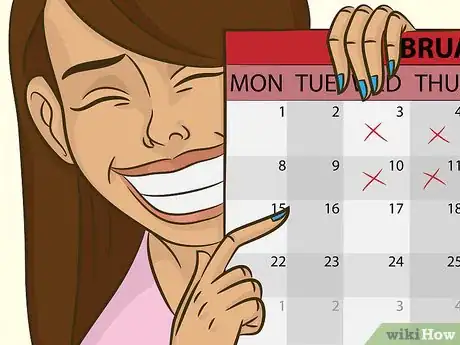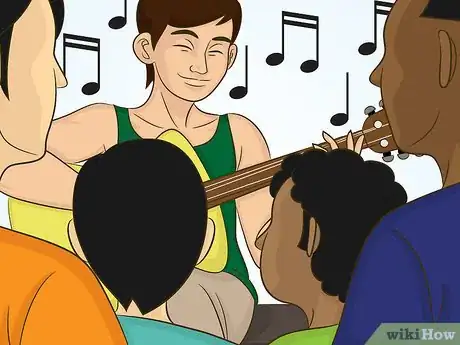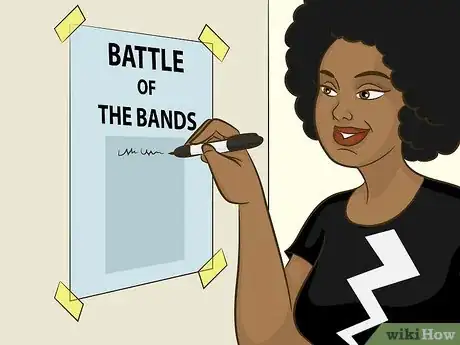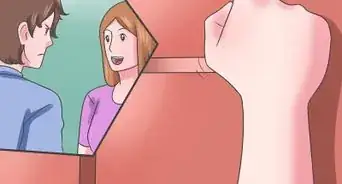This article was co-authored by Nicolas Adams and by wikiHow staff writer, Kyle Hall. Nicolas Adams is a 5th generation musician of Serbian Gypsy descent and the lead guitarist of the band Gypsy Tribe. Based in the San Francisco Bay Area, Nicolas specializes in Rumba Flamenco and Gypsy jazz and playing the guitar, Bouzouki, Balalaika, and piano.
wikiHow marks an article as reader-approved once it receives enough positive feedback. In this case, 100% of readers who voted found the article helpful, earning it our reader-approved status.
This article has been viewed 586,632 times.
Performing live at a venue is a great way to get your band exposure and build up your fan base, but first you have to land the gig. To better your chances of getting gigs for your band, you'll want to choose venues that match your band's style and network with your acquaintances and industry insiders. By being persistent and getting your band's name out there, you can start securing more gigs and building your following.
Steps
Networking to Get Gigs
-
1Reach out to people in your network. Let your friends, family, coworkers, classmates, and anyone else you're acquainted with know that you're in a band and you're looking for gigs. Ask them if they know any promoters or anyone that works for the management of a local venue that could help you land a gig.[1]
- Try sending out a mass email with samples of your music to everyone in your network. Ask them to pass it on if they know anyone who could help out your band.
- For example, you could write "Hey friends and family, my band The Sunflowers wants to put on some great shows for you guys, and we could really use your help finding some gigs so that can happen. Here are a couple of our songs, please pass them on if you know anyone that could help. Thanks!"
-
2Network with other similar bands in your area. They'll likely have connections with insiders who could get you gigs at venues that would appreciate your musical style. If you don't know any similar local bands, run a quick search online or check on social media.[2]
- For example, if you're in a heavy metal band, try to connect with other heavy metal bands nearby. Search online for "heavy metal bands in New York City" or "local New York City heavy metal bands."
- Once you've found a local band to connect with, you can reach out to them on social media or attend one of their shows and introduce yourself in person.
-
3Contact event promoters over the phone or by email. Research local venues you'd be interested in playing at and visit their websites to find the contact information for their promoters. The information might be listed under “booking” or “programming.” Give the promoter a call and tell them your band is interested in doing a show at their venue.[3]
- If only the promoter's email is listed, shoot them an email and make sure to include your band name and samples of your music.
-
4Network with promoters in person. Call local promoters and ask if you can stop by for a few minutes to drop off a sample of your music. Start with promoters at smaller venues where it will be easier to get your foot in the door. Don't be offended if they say no. If you do get a meeting, make sure you really sell your band to the promoter; you want to be friendly and engaging, but not pushy.[4]
- For example, you could say something about your band like "We always have a great time with the crowd when we perform. We like to engage with the people who come out to see us so they feel like they're part of the show too. I think the intimate setting here would be perfect for that."
Pitching to Venues
-
1Make recordings of your music to play to venues. You can record the music on your computer or invest in nicer equipment to record with; the important thing is to have samples of your songs so venues can get an idea of what your sound is like. Try to have at least 2-3 tracks recorded before you start pitching.[5]
- Try to have a digital copy of your songs to send through email and a hard copy (like a CD) to give to venues in person.
- You can also go to a recording studio. Cheaper studios cost around $40 an hour, while some places go up to $100 and $200.[6]
- It'll take around 50 hours to record a full-length, 10-track album.[7]
-
2Pitch to venues where similar local artists are getting gigs. Venues will be more likely to take a chance on your band if you're the type of act they usually book. Follow similar bands on social media and keep track of where they're performing. Add those venues to the list of venues you want to pitch.[8]
- For example, if you're in a jazz band, find out what venues other local jazz bands are playing at. Those venues draw a crowd that enjoys jazz, so you'll have a better chance of booking a gig there than at a venue that frequently features alternative rock bands.
-
3Offer to perform on a weeknight. Don't worry about getting a primetime Saturday-night slot if you're just starting out. Tell venues you're available for any open slots, including weeknights. Not as many bands will be competing for these spots, so you'll have an easier time getting a gig.[9]
-
4Take high pay/low fan gigs to fund your band. Don't be afraid to play a paid gig at a birthday party or a wedding to earn some money. Take the money you make from those gigs and use it to pay for the expenses of playing a low pay/high fan gig where you'll get more exposure.[10]
- Try not to perform for free—this hurts the economy for musicians.[11]
Getting Your Name Out There
-
1Sign up for a local "battle of the bands" competition. Search "Los Angeles battle of the bands" online to find upcoming competitions. Look for competitions that offer prizes like a slot in a local music festival lineup.[12]
- Take the competition seriously and rehearse. Put on a great show like you would at any other gig. Have high energy and engage with the audience; there could be local promoters in the audience.
-
2Ask if you can open for another local band. Look online to see what similar bands in your area have upcoming performances. Reach out through social media and ask if they want an opening act for their show.[13]
-
3Build up your social media presence. Promoters like bands that come with a following. Use your social media clout as a selling point when pitching to venues. A few things you can do to get more followers online are:[14]
- Make a Facebook artist page for your band. Have everyone in the band invite their friends on Facebook to like the page.
- Stay active on your social media accounts. Share updates about your band, your upcoming show dates, and your new music. Respond to people that tweet at your or comment on your Facebook page.
- Connect with similar local artists. Share their posts and retweet them. Give their upcoming shows shoutouts. Building relationships with other similar bands can help you attract their followers.
-
4Invite the press to your shows. Email local newspapers, music magazines, and music bloggers, inviting them to your upcoming gig. A write up about your band is good publicity and you could land more gigs by word of mouth.
Community Q&A
-
QuestionIs social media a must for the band?
 Community AnswerYes. In the modern world this will help you greatly and help keep your loyal fans up to date on your bands doings.
Community AnswerYes. In the modern world this will help you greatly and help keep your loyal fans up to date on your bands doings. -
QuestionHow can my band be taken more seriously at venues and with crowds?
 Community AnswerA professional band usually looks coherent. Have everyone dress appropriately and in similar attire (not matching outfits, just in the same style). Make sure you are friendly and articulate when addressing anyone and always show up with all the proper equipment so you aren't asking people at the venue to borrow all sorts of things.
Community AnswerA professional band usually looks coherent. Have everyone dress appropriately and in similar attire (not matching outfits, just in the same style). Make sure you are friendly and articulate when addressing anyone and always show up with all the proper equipment so you aren't asking people at the venue to borrow all sorts of things. -
QuestionWhat are some ways I can get gigs with a middle school band I just started with my friends?
 Community AnswerTake every opportunity to perform and build a reputation as a musician. Set up a Facebook page or some kind of blog to post about your band and advertise your band. Then you can contact places around town and refer them to your page and let them see what you do for themselves.
Community AnswerTake every opportunity to perform and build a reputation as a musician. Set up a Facebook page or some kind of blog to post about your band and advertise your band. Then you can contact places around town and refer them to your page and let them see what you do for themselves.
References
- ↑ https://www.musicindustryhowto.com/gigging-101-how-to-get-gigs-the-ultimate-guide/
- ↑ http://blog.sonicbids.com/5-things-every-musician-needs-to-book-great-gigs
- ↑ https://www.musicindustryhowto.com/gigging-101-how-to-get-gigs-the-ultimate-guide/
- ↑ http://www.musicthinktank.com/blog/7-insider-tips-on-getting-more-gigs-for-your-band.html
- ↑ http://blog.sonicbids.com/5-things-every-musician-needs-to-book-great-gigs
- ↑ Nicolas Adams. Professional Guitarist. Expert Interview. 17 September 2019.
- ↑ Nicolas Adams. Professional Guitarist. Expert Interview. 17 September 2019.
- ↑ https://www.musicindustryhowto.com/gigging-101-how-to-get-gigs-the-ultimate-guide/
- ↑ http://www.musicthinktank.com/blog/7-insider-tips-on-getting-more-gigs-for-your-band.html
- ↑ http://diymusician.cdbaby.com/musician-tips/secret-formula-getting-gigs/
- ↑ Nicolas Adams. Professional Guitarist. Expert Interview. 17 September 2019.
- ↑ https://www.musicindustryhowto.com/gigging-101-how-to-get-gigs-the-ultimate-guide/
- ↑ https://www.musicindustryhowto.com/gigging-101-how-to-get-gigs-the-ultimate-guide/
- ↑ http://www.bbc.co.uk/programmes/profiles/5SFqBPmPbLCjtNmwFyKcNXW/getting-gigs

































